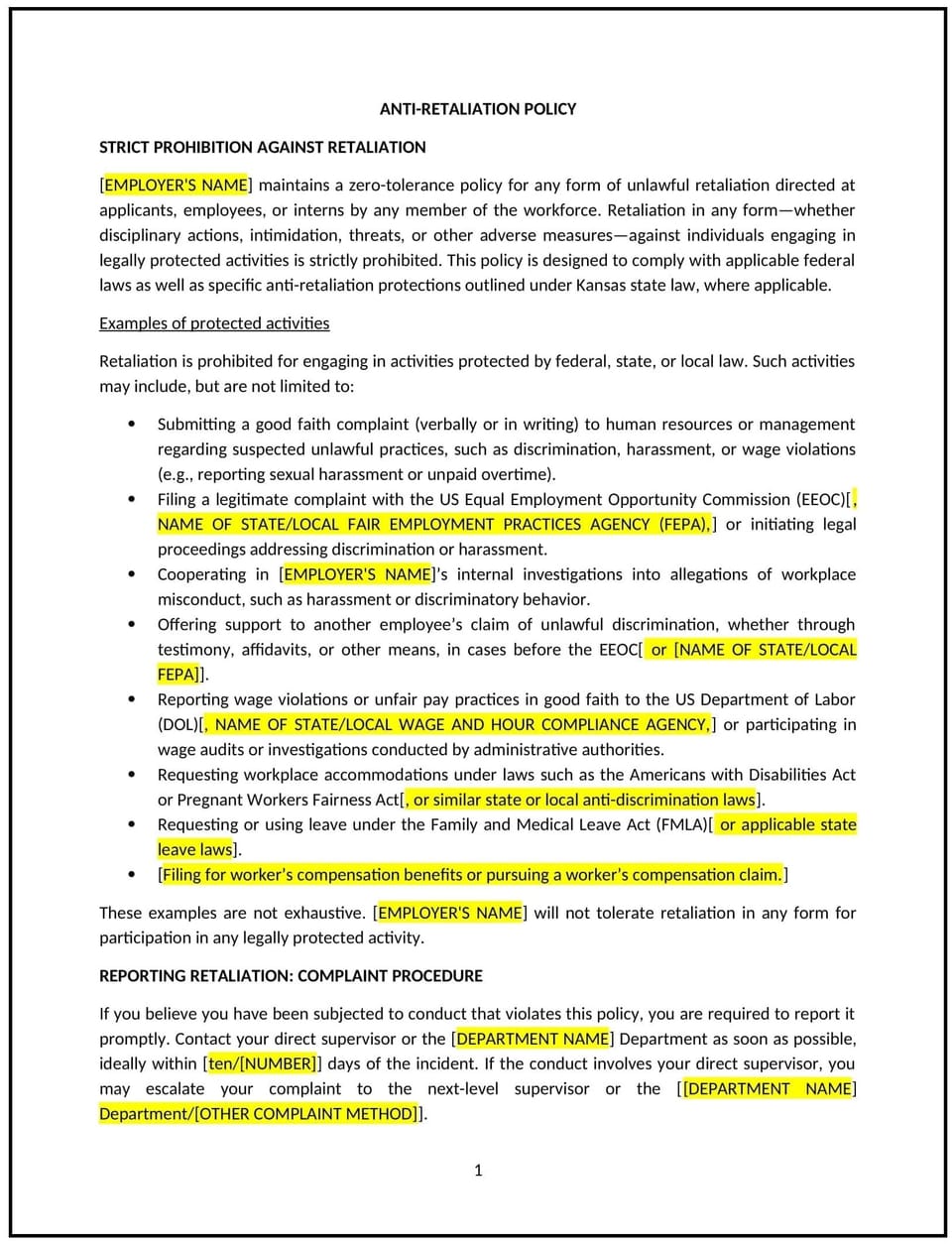Anti-retaliation policy (Kansas): Free template

Anti-retaliation policy (Kansas)
An anti-retaliation policy helps Kansas businesses protect employees who report concerns about workplace misconduct, discrimination, harassment, or unethical behavior. This policy outlines protections against retaliation, establishes reporting procedures, and reinforces the business’s commitment to maintaining a fair and transparent work environment.
By implementing this policy, businesses can encourage employees to report concerns without fear, foster a culture of accountability, and promote ethical workplace practices.
How to use this anti-retaliation policy (Kansas)
- Define retaliation: Businesses should clearly explain what constitutes retaliation, such as demotions, pay reductions, unfair treatment, or exclusion due to an employee’s report of misconduct.
- Establish reporting procedures: Employees should have clear, confidential ways to report retaliation concerns, including direct contacts within HR or designated compliance officers.
- Outline investigation steps: Businesses should describe how retaliation claims will be reviewed, ensuring a fair, confidential, and structured process.
- Prohibit retaliation: Businesses should make it clear that retaliation against employees who report concerns, participate in investigations, or refuse unethical directives is not acceptable.
- Implement disciplinary actions: Businesses should specify the consequences for engaging in retaliatory behavior, ensuring consistent enforcement.
- Promote workplace education: Businesses should train managers and employees on retaliation protections and the importance of maintaining an open, fair work environment.
- Review and update regularly: Businesses should periodically assess and update the policy to align with operational needs and evolving workplace best practices.
Benefits of using an anti-retaliation policy (Kansas)
- Encourages open communication: Employees are more likely to report concerns when they feel safe from retaliation.
- Reduces workplace conflicts: Clear policies help prevent disputes by defining acceptable and unacceptable responses to complaints.
- Strengthens legal protections: Protects businesses from potential claims by demonstrating a commitment to fair treatment.
- Builds trust with employees: A transparent approach reassures employees that concerns will be handled fairly.
- Promotes accountability: Establishes clear consequences for retaliatory behavior, reinforcing ethical standards.
- Supports ethical business practices: Encourages businesses to handle reports professionally and address concerns without fear of backlash.
Tips for using this anti-retaliation policy (Kansas)
- Communicate protections clearly: Employees should understand their rights and the steps to report retaliation concerns.
- Provide multiple reporting channels: Businesses should offer confidential and accessible ways to report potential retaliation.
- Address complaints promptly: Timely investigations help prevent further retaliation and maintain workplace trust.
- Train leadership and employees: Businesses should educate managers on identifying and preventing retaliatory behavior.
- Document all reports and actions: Maintaining records of complaints and investigations helps businesses track trends and ensure fair enforcement.
- Apply policies consistently: Businesses should enforce anti-retaliation measures fairly across all departments and levels of the organization.
Q: Why should Kansas businesses implement an anti-retaliation policy?
A: Businesses should implement an anti-retaliation policy to protect employees who report concerns, maintain a culture of accountability, and reduce legal and reputational risks associated with retaliation claims.
Q: What should businesses include in an anti-retaliation policy?
A: Businesses should define retaliation, outline reporting procedures, describe the investigation process, prohibit retaliatory actions, and set clear consequences for policy violations.
Q: How should businesses handle retaliation complaints?
A: Businesses should provide a structured and confidential reporting process, investigate complaints impartially, and take corrective action when necessary. Following a consistent approach helps maintain fairness.
Q: What steps should businesses take to prevent retaliation?
A: Businesses should educate managers and employees on retaliation protections, promote transparency in handling complaints, and encourage a workplace culture where concerns are addressed without fear of backlash.
Q: How can businesses protect employees from retaliation after reporting concerns?
A: Businesses should ensure confidentiality, monitor workplace behavior for signs of retaliation, and address any concerns immediately. Providing follow-up support to employees who report concerns can help reinforce protection.
Q: How often should businesses review and update their anti-retaliation policy?
A: Businesses should review their policy at least once a year or whenever significant changes in workplace practices or legal considerations arise. Regular updates help maintain effectiveness.
This article contains general legal information and does not contain legal advice. Cobrief is not a law firm or a substitute for an attorney or law firm. The law is complex and changes often. For legal advice, please ask a lawyer.


